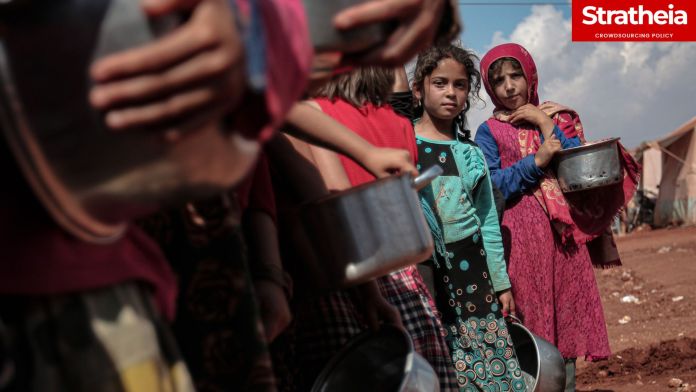Russia has, yet again, orchestrated the end of a long-running United Nations humanitarian operation in Turkey, delivering aid to 4 million people in rebel-held northwest Syria as it vetoed a nine-month authorization renewal at a U.N. Security Council session.
Instead, Russia insisted on renewal within six months. However, their proposal also needed help to get the nod amid deadlock at the session. The humanitarian operation, which has been delivering food, shelter, and medicines since 2014, has not been supported by Russia, which considers it a violation of Syria’s sovereignty. On the other hand, the UK and 12 other council members voted for the renewal of cross-border aid access, considering it a vital element for the Syrian rebel-held population. To be adopted, a resolution needs at least nine votes in its favor and no vetoes by any of the council’s five permanent members.
Responding to the act of Russia, the US ambassador to the UN called it a “sad moment for the people of Syria,” calling it “an act of cruelty by Russia.” He further accused Russia of acting as a “Bully in the playground.” She insisted: “We must keep at this – the Syrian people are counting on us – and we must all urge Russia to return to the table in good faith.” After the horrific earthquake in Syria and Turkey in February, cross-border aid deliveries were temporarily allowed at the Bab al-Salam and al-Ra’ee crossings. Still, permissions for these expire on the 13th of next month, meaning that if nothing changes, no aid will enter Syria over any land border after the expiry of the deadline.
Russia had opposed the Syrian aid mechanism for a long time, toeing the lines of the Syrian government, who had always termed it an attack on their sovereignty. However, the issue at hand is purely humanitarian, which has unfortunately been amalgamated with political issues.
The power of Syria is primarily a political slogan. Russia, a close ally of the Syrian regime, has always stood behind the Syrian government through thick and thin.
This act of Russia has received severe criticism as it practically disconnects the Syrian rebel-held population from humanitarian support, which may lead to a catastrophe in the area; thus, putting humanitarian aid to a standstill for mere political objectives is hard to digest and may put Russia on a weak footing in the times to come. On the other hand, the US and its allies are exploiting the situation to their utmost benefit. Many terms it as a tactic to starve Bashar Ul Assad’s opposition-held areas, as practically, those are the only localities where he has no control. Bashar Ul Asad has regained control of the entire country, less the locations where UN-sanctioned humanitarian aid will be distributed. Thus, all opposing voices to Russia have reacted strongly to the Russian act terming it a political act against a purely humanitarian issue that is unjustified and against all norms and customs of humanity. The case has also triggered a significant debate about utilizing humanitarian aid once it’s served. The pro-Russian lobby has raised serious questions over the past years about using such aids and emphasized the need to devise a mechanism to track its use. Many also link the assistance provided to the support rendered in Africa, where political groups and rebel groups utilized humanitarian aid for a long time for their political objectives. Thus, more voices are being heard to monitor such aides in times to come closely.
Russia has faced such situations in the past. Such decisions by countries as powerful as Russia are taken with a clear intent and political purpose. However, it is more appropriate to resolve humanitarian issues amicably with the mutual consent of all stakeholders so that human beings do not become sufferers nor face any more calamities or catastrophes. On the other hand, the concerns about the desired viz a viz actual utilization of aid also need to be addressed so that the real purpose is served, which is to serve humanity in the time of need.
After all, it’s humanity that must always have the last laugh.

The author is a freelance writer who is a graduate of NUST and an engineer by profession. The writer enjoys a specific nag of writing his heart out for his readers. He tweets @ua4423200

